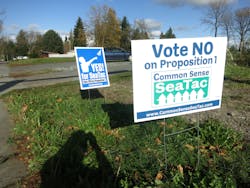Nov. 12--Supporters and opponents of SeaTac's $15-an-hour minimum-wage measure remain locked in a dead heat Tuesday, with only 43 votes separating them.
Proposition 1 kept its lead with 50.4 percent of 5,323 ballots counted as of Tuesday.
"We know votes are just going to keep trickling in like this, and we have to be patient," said Heather Weiner, spokeswoman for pro-Proposition 1 organization Yes! for SeaTac.
Tuesday's results represented something of a victory for Proposition 1: After celebrating an election-night lead of 261 votes, supporters saw that margin of victory all but disappear to 43 votes by Friday night, as opponents closed the gap with each new round of numbers.
Only 278 additional votes were counted Tuesday, and 139 fell to each side. An estimated 400 to 500 ballots still must be counted. That means that to close the gap, the No campaign needs about 55 percent of the remaining votes.
"We're hoping to make up some ground," said Gary Smith, spokesman for anti-Proposition 1 group Common Sense SeaTac. "The next batch could be better for us. We'll just have to wait and see."
Both campaigns said about 150 ballots cast in SeaTac were rejected because voters' signatures did not match records. Each side has a list of favorable voters with signature problems and is asking them to return paperwork that restores their ballots.
Votes will be counted each weekday until results are certified Nov. 26 by the King County Canvassing Board. State law provides no automatic recount for local ballot measures, but a campaign can request one at its own expense.
Proposition 1 would create a $15-an-hour minimum wage for hospitality and transportation workers at about 70 airport-related businesses in SeaTac, including airline service contractors, hotels with more than 100 rooms and car-rental agencies.
The measure also would guarantee annual inflation adjustments and paid sick leave. It would require affected employers to offer more hours to part-time workers before hiring additional part-timers and to keep employees for at least three months after an ownership change. Those requirements can be waived in a union contract.
Win or lose at the ballot box, Proposition 1 already is headed back to court.
Airport food concessionaire Filo Foods, along with Alaska Airlines and the Washington Restaurant Association, filed an amended lawsuit Friday in King County Superior Court seeking to invalidate the ballot measure.
In addition to suing the city of SeaTac, Proposition 1 opponents now are bringing legal action against the Port of Seattle, which owns and operates Seattle-Tacoma International Airport.
The amended suit by opponents claims Proposition 1 is unenforceable because it exceeds the small city's initiative power and legislative authority, noting that the airport falls under the Port of Seattle's control.
The suit argues that Proposition 1 purports to regulate parts of the employer-employee relationship and conflicts with federal law, including the Railway Labor Act, which covers Alaska Airlines and other major air carriers.
In the case of Filo Foods and sister company BF Foods, the complaint states that their employees "have not chosen to be represented by a union, but the proposed ordinance improperly encourages unionization and collective bargaining."
Proposition 1 opponents tried unsuccessfully last summer to block the measure, arguing that petitions collected by supporters did not have enough valid signatures to qualify for the Nov. 5 ballot.
In September, a three-judge panel of the Washington Court of Appeals reversed a judge's ruling that voided some signatures, giving Proposition 1 the go-ahead. The appeals court panel did not elaborate as to why King County Superior Court Judge Andrea Darvas erred in her prior ruling, saying only that a more detailed opinion explaining its order would "follow in due course."
The lawyer for Prop 1's opponents, Harry Korrell of Davis Wright Tremaine, said his clients are moving forward with the legal challenge because of the measure's Jan. 1 start date.
"Any company affected by this will have to make adjustments to its payscale and comply with a host of new regulations," Korrell said. "It would be better to know before January 1 if this measure is illegal, as we believe it is."
Weiner, of Yes! for SeaTac, said it's too soon to argue the legal merits of Proposition 1.
"We've got a recount almost guaranteed at this point," she said.
Seattle Times researchers Justin Mayo and Gene Balk contributed to this story. Information from Seattle Times archives is included.
Amy Martinez: 206-464-2923 or [email protected]. On Twitter: @amyemartinez
Copyright 2013 - The Seattle Times





